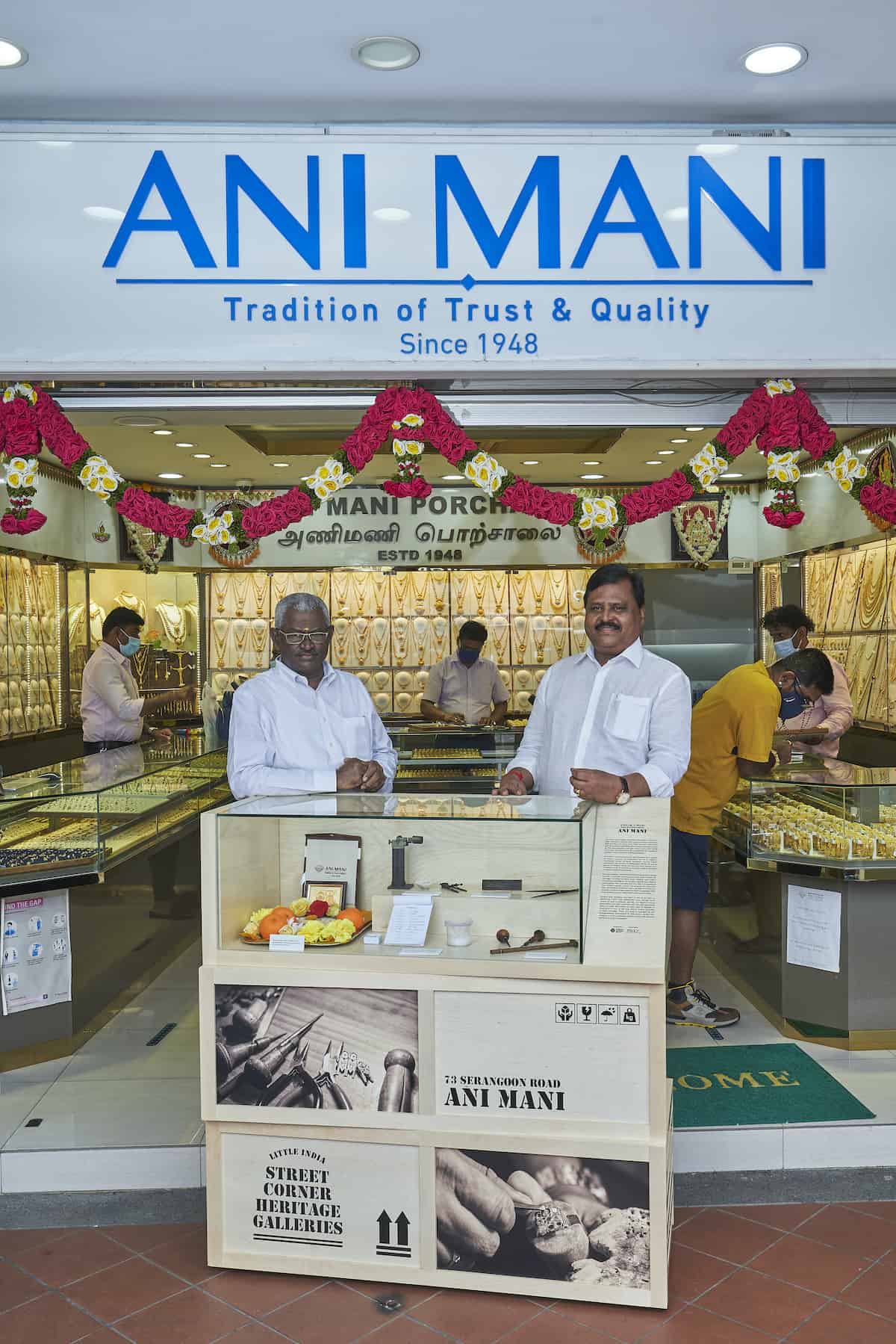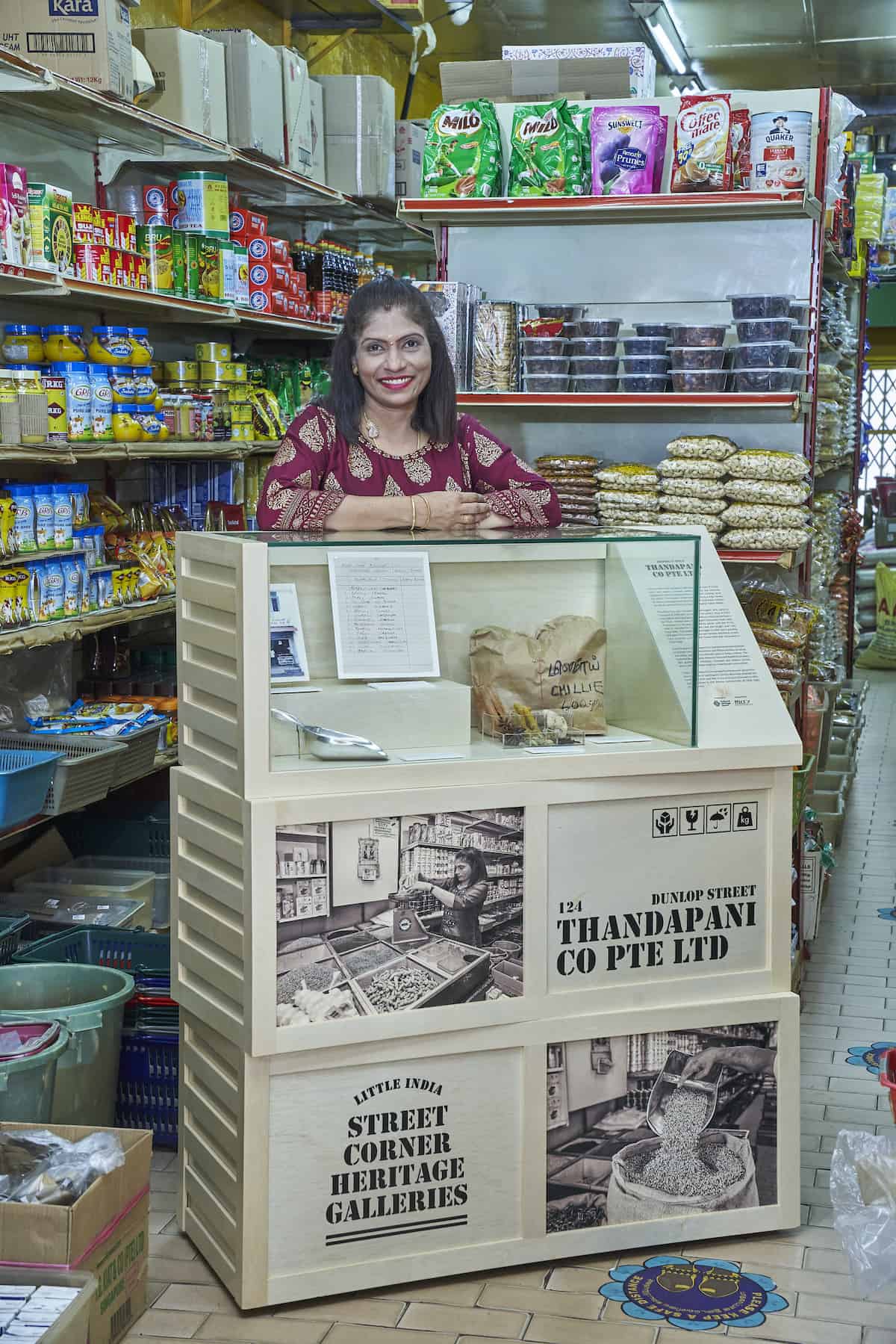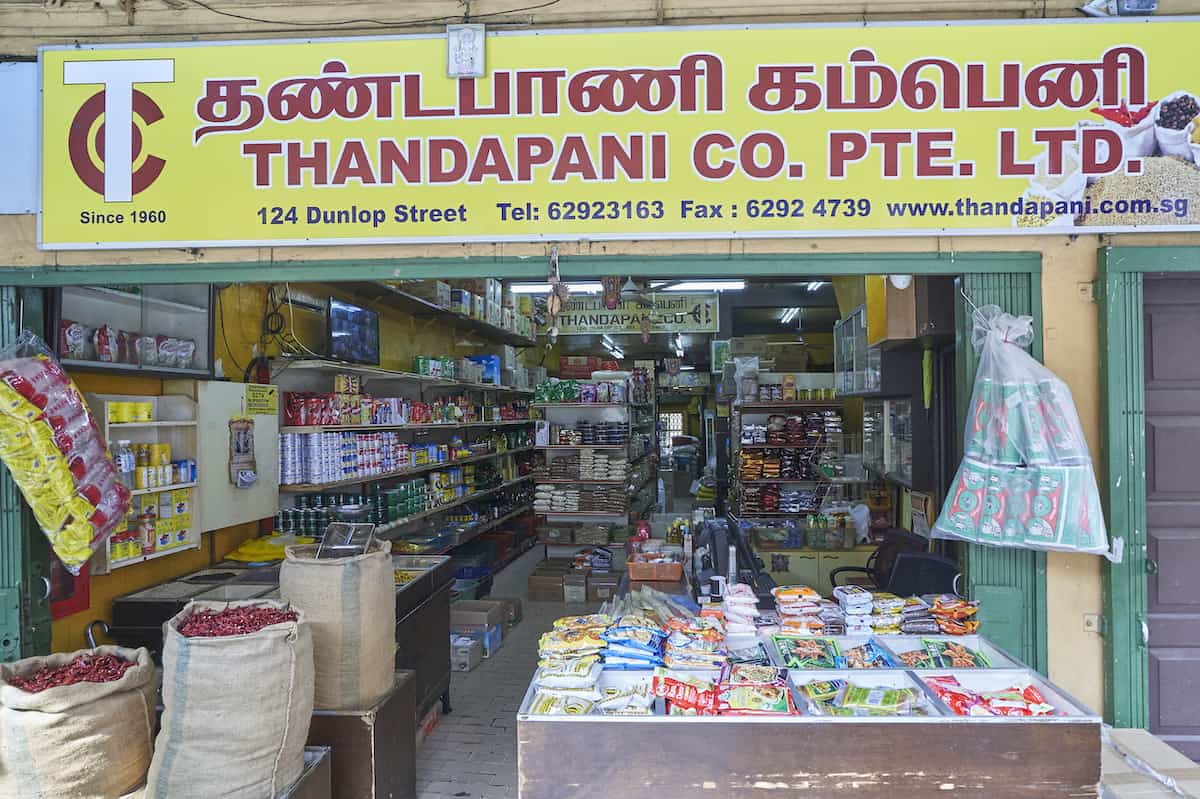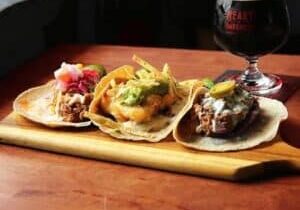The heritage stores of Little India
The shops in Little India have grown with the Indian diaspora. And some have become famous. Like the hole-in-the-wall flower shop that morphed into a multimillion-dollar store selling everything needed for pujas. And the jewellery shop on the other side of the main street where a goldsmith begins crafting wedding ornaments before dawn because that is considered an auspicious hour.
Little India regulars will, of course, realise that we are referring to Jothi Store and Flower Shop and the Ani Mani Porchalai jewellery store, thriving businesses now being showcased by the National Heritage Board for their proud history.
Jothi Store and Flower Shop

Jothi Store founder Murugaia Ramachandra (left) and his son Chandra Rajakumar, (All pictures courtesy National Heritage Board)
Jothi Store and Flower Shop, at 1 Campbell Lane, on the other side of Serangoon Road from Tekka market, has become virtually a household name among Indians for purveying all things religious from images of gods to incense sticks and sandalwood paste for worship. The shop occupies three floors of a five-storey building, whose top two floors are used to stock merchandise. Besides religious paraphernalia, it sells cosmetics, food, household utensils and herbal items too.
The store has grown with the Indian diaspora. Its annual turnover has soared from about half a million dollars in the 1980s to $20 million now, says Mr Chandra Rajakumar.

Jothi Store entrance and below images of gods in the shop

The business expanded as the number of Indian expatriates increased in the new millennium, says Mr Chandra.
Looking at the busy, imposing store, it is hard to believe the business started as a hole-in -the-wall flower shop in the same lane.
Mr Murugaia Ramachandra, Mr Chandra’s father, became a flower seller in 1960 – when Mr Chandra was only two years old – for lack of any other job.
Now a sprightly 90-year-old, Mr Murugaia still attends to the business for one or two hours a day, says Mr Chandra.
An immigrant, Mr Murugaia came from Tanjore district in Tamil Nadu in 1948.
He worked for The Straits Times and later was the chief librarian of the Singapore Tiger Standard newspaper, he says. But he lost his job when the newspaper closed down in 1958.
After two years of joblessness, he became a flower seller. His customers were people who went to the temples in Little India and offered flowers to the gods.
The five-storey building now occupied by Jothi Store was not acquired overnight. Mr Murugaia first rented space. He bought the whole building only in 1991-92, says his son. The woman who owned the building and lived above the shops was willing to sell only to Mr Murugaia, adds Mr Chandra.
Mr Chandra says he began helping his father in the business when he was nine years old.
After attending Beatty Secondary School, he went to the University of Manitoba, in Canada, to study computer science in 1981. On his return to Singapore in 1985, he became fully involved in the business.
The business grew because it attended to the customers’ needs, he says. As more North Indians came to work in Singapore in the new millennium, the store catered to them too. It began to carry items needed for North Indian festivals like Holi and Raksha Bandhan.
When the store had to close because of the circuit breaker to curb the spread of Covid-19 in April 2020, he took the business online. It maintains its online store, but most customers want to “see, touch and buy” things, he adds.
Ani Mani Porchalai

Ani Mani Porchalai directors PV Asokan (left) and Subbiah Ramu
Ani Mani Porchalai on busy Serangoon Road has been making and selling jewellery since 1948. It is renowned for casting the thali, the wedding pendant worn by South Indian women.
An average thali costs upwards of $800, excluding the price of the gold chain it is fastened to, says Mr Subbiah Ramu, gemologist and director of Ani Mani Porchalai.
“Ani mani” means “to adorn with jewels” in Tamil and “porchalai” is a jewellery shop.
Mr Subbiah and fellow director P.V. Asokan are both descended from the shop’s founders. Both came from Tamil Nadu, where Mr Subbiah did his MBA in Chennai.
The shop has an annual turnover of $30 million, says Mr Subbiah.



Thalis (top), chains (centre) and jewellers’ tools (above)
It is not one but two shops, both on Serangoon Road, the second outlet opened in 2019.
A third outlet is planned as well in Little India, once business improves, he adds. The pandemic has affected business with the tourists gone, he says.
Ani Mani also sells gemstones believed to bring good fortune.
The thalis require special care because they are wedding pendants. Ani Mani conducts a prayer session at the in-store altar when customers come to collect their thalis.
A jeweller comes to the shop and starts making the thalis at the Brahma muhurta, before sunrise. The Brahma muhurta is believed to be an auspicious time for prayers and doing anything good or holy.
Mr Arumugam Dakshinakumar, a jeweller making thalis, comes from a family of goldsmiths. In Singapore on an S Pass, he previously worked in Malaysia and before that in India, his homeland.
Jeweller Arumugam Dakshinakumar making a thali at Ani Mani Porchalai
Thandipani Co

Ms Meena at her shop, Thandipani Co

Thandipandi Co is another Little India store being showcased by the National Heritage Board (NHB). The provision store in Dunlop Store is known for its special mixes of spices and curry powder for cooking Indian dishes. The store creates the mixes and powder using its own recipes, says Ms Meena, whose father-in-law founded the business.
Her father-in-law, Sanmugam, came to Singapore in 1946 and worked at his uncle’s shop in Little India before setting up his own spice business in the area in the 1960s. He named his shop after his favourite deity, Lord Murugan.
Over the years, the shop’s customers have come to include Chinese restaurants and Malay families. There are Chinese who like spicy food, says Ms Meena. Especially popular are Thandipani Co’s biryani masala, mutton masala and rasam powder, she adds.
The National Heritage Board’s Street Corner Heritage Galleries scheme is a move to showcase popular local enterprises that are at least 30 years old. It is part of an effort to increase appreciation for heritage businesses. The selected shops have showcases displaying their tools, mementos and old artefacts reminding people of their heritage.
Besides Jothi Store and Flower Shop, Ani Mani Porchalai and Thandipani Co, five other Little India landmarks are featured in the Street Corner Heritage Galleries scheme. These include the restaurants Ananda Bhavan, Komala Vilas and The Banana Leaf Apolo, the Hanifa Textiles store and SIS Premium Meats.
Mr Alvin Tan, Deputy Chief Executive (Policy & Community), National Heritage Board, said: “With the launch of this new batch of galleries, we hope not only to expand our networks of “mini- museums”, but more importantly, to showcase the interesting people and stories behind heritage businesses in Little India and to document how they evolve, thrive and grow over the years to become the household names they are today.”











